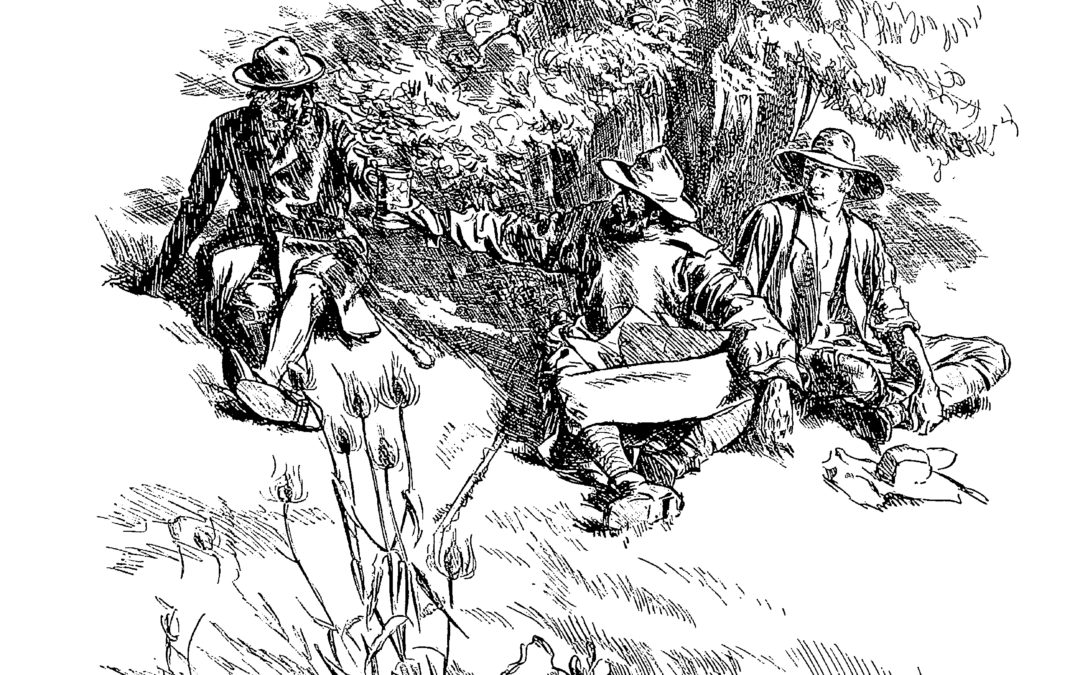 Hawthorne’s The Blithedale Romance is the story of Blithedale. On this communal farm, Mile Coverdale and Charles Hollingsworth vie for Priscilla’s affection, an ethereal waif as she seems to float rather than walk on the ground. One of Frederick...
Hawthorne’s The Blithedale Romance is the story of Blithedale. On this communal farm, Mile Coverdale and Charles Hollingsworth vie for Priscilla’s affection, an ethereal waif as she seems to float rather than walk on the ground. One of Frederick...
 The painting was exhibited in 1853 with the title Le repos des Moissonneurs, aka Harvesters Resting. Millet’s harvesters are Nooning, and this is a stop for lunch and not a picnic. Though the harvesters are portrayed as contemporary agricultural workers, the subtext...
The painting was exhibited in 1853 with the title Le repos des Moissonneurs, aka Harvesters Resting. Millet’s harvesters are Nooning, and this is a stop for lunch and not a picnic. Though the harvesters are portrayed as contemporary agricultural workers, the subtext...
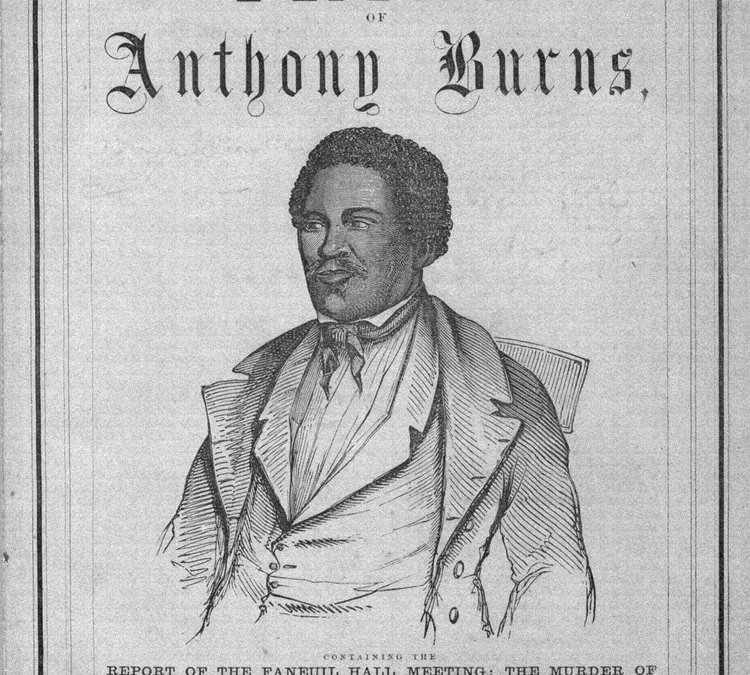 At the Harmony Grove picnic dedicated to abolishing slavery, Thoreau read portions of what became his essay “Slavery in Massachusetts” completed later that year. The occasion was a Fourth of July celebration, and among Thoreau’s concerns was the fugitive Henry...
At the Harmony Grove picnic dedicated to abolishing slavery, Thoreau read portions of what became his essay “Slavery in Massachusetts” completed later that year. The occasion was a Fourth of July celebration, and among Thoreau’s concerns was the fugitive Henry...
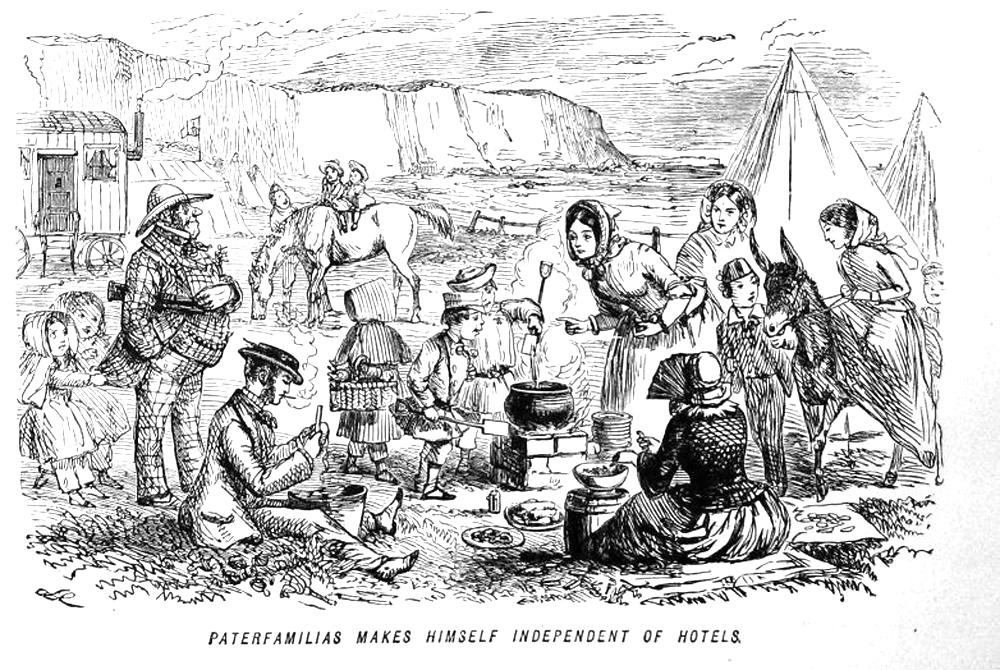 Leech’s joke here is the smugness of the father of the family (paterfamilias), who would rather inconvenience his family by camping on the beach instead of staying at a hotel. This large family putting up with the man is an implicit joke because no one protests...
Leech’s joke here is the smugness of the father of the family (paterfamilias), who would rather inconvenience his family by camping on the beach instead of staying at a hotel. This large family putting up with the man is an implicit joke because no one protests...
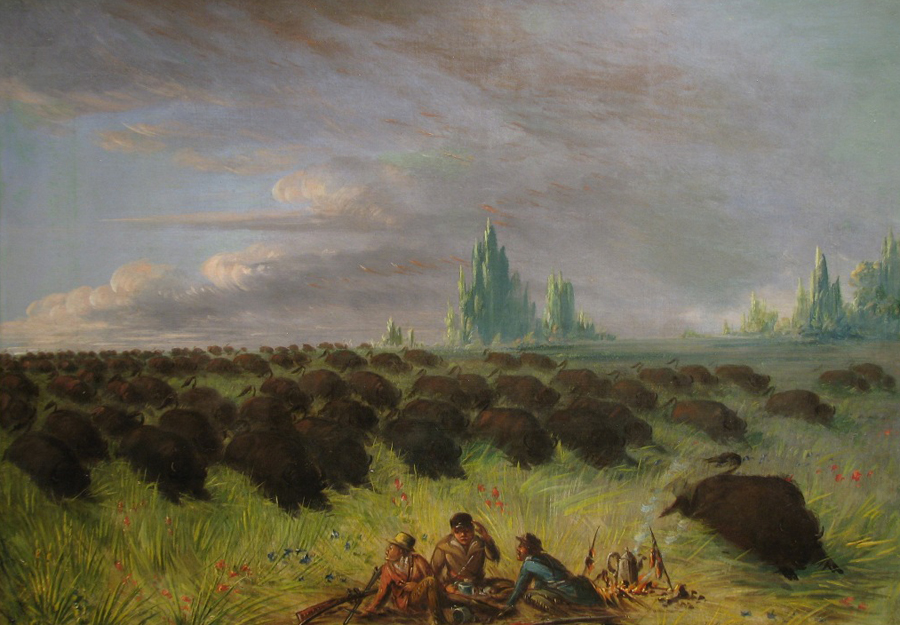 When Charles Dickens visited the Looking Glass Prairie in 1842, it reminded him of a Catlin exhibition in London. “The sun was going down, very red and bright,” Dickens writes, “and the prospect looked like that ruddy sketch of Catlin’s, which...
When Charles Dickens visited the Looking Glass Prairie in 1842, it reminded him of a Catlin exhibition in London. “The sun was going down, very red and bright,” Dickens writes, “and the prospect looked like that ruddy sketch of Catlin’s, which...
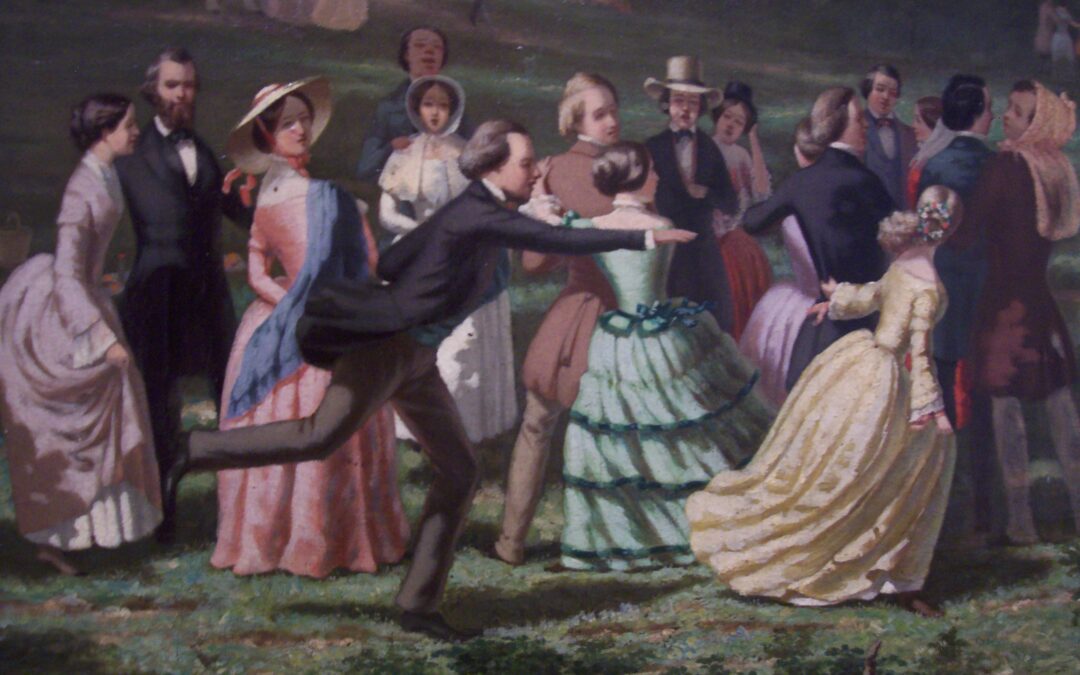 One hundred and fifty-six miles west of Cincinnati, and thirty-two years after Francis Trollope settled there, David Broderick Walcott’s Hocking Valley Picnic (1854) makes picnicking ordinary. Twenty years of picnic progress made a substantial difference in...
Thompson’s painting has often been retitled. It has been Pic Nick, A Pic Nick, Camden, Maine], and is currently A Pic Nick in the Woods of New England. The menu included ham [with cloves], roast chicken, clams, potatoes or baked beans? [in a dish], bread, wine,...
One hundred and fifty-six miles west of Cincinnati, and thirty-two years after Francis Trollope settled there, David Broderick Walcott’s Hocking Valley Picnic (1854) makes picnicking ordinary. Twenty years of picnic progress made a substantial difference in...
Thompson’s painting has often been retitled. It has been Pic Nick, A Pic Nick, Camden, Maine], and is currently A Pic Nick in the Woods of New England. The menu included ham [with cloves], roast chicken, clams, potatoes or baked beans? [in a dish], bread, wine,...
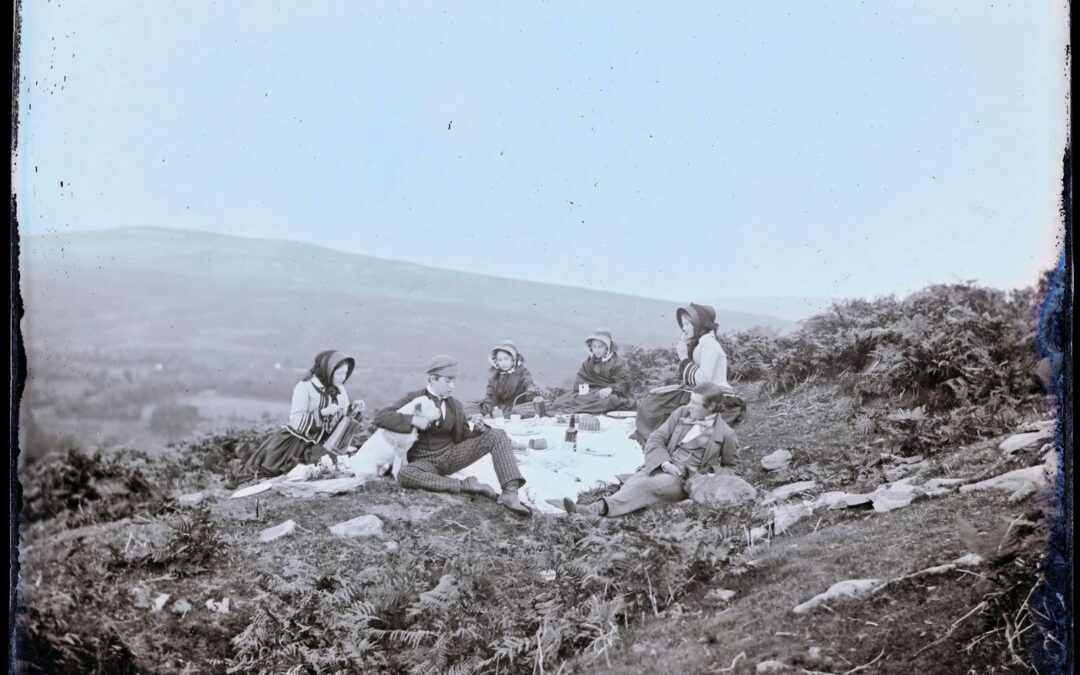 According to family lore, Llewelyn photographed his wife Emma each year on her birthday, September 23, 1855. From a picnic point of view, it’s fortuitous because, to my knowledge, this is the first photograph ever of a picnic. *Llewelyn was a pioneer...
According to family lore, Llewelyn photographed his wife Emma each year on her birthday, September 23, 1855. From a picnic point of view, it’s fortuitous because, to my knowledge, this is the first photograph ever of a picnic. *Llewelyn was a pioneer...
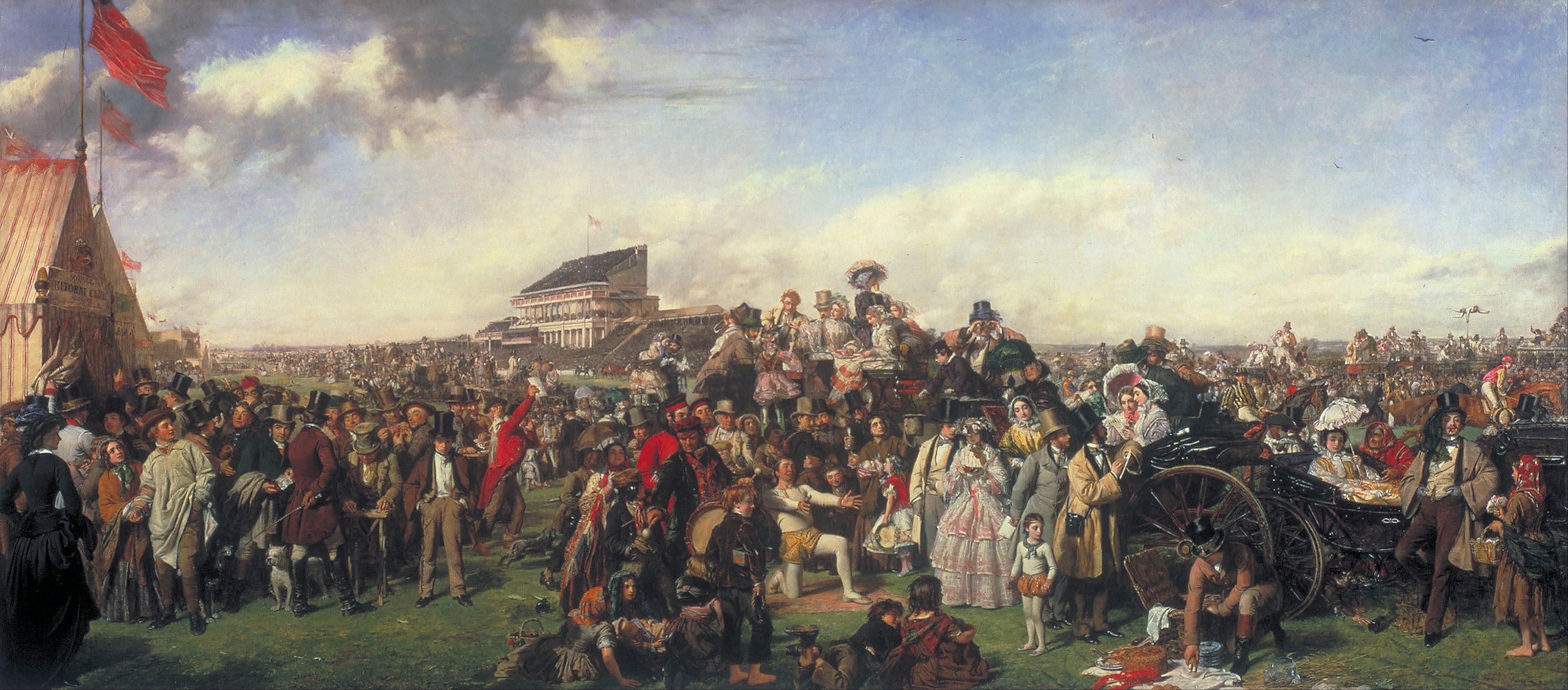 “My first Derby,” William Powell Frith explained, “had no interest for me as a race, but as giving me the opportunity of studying life and character.” after considerable preparation, Frith eventually painted the scene as an amusement tinged...
“My first Derby,” William Powell Frith explained, “had no interest for me as a race, but as giving me the opportunity of studying life and character.” after considerable preparation, Frith eventually painted the scene as an amusement tinged...
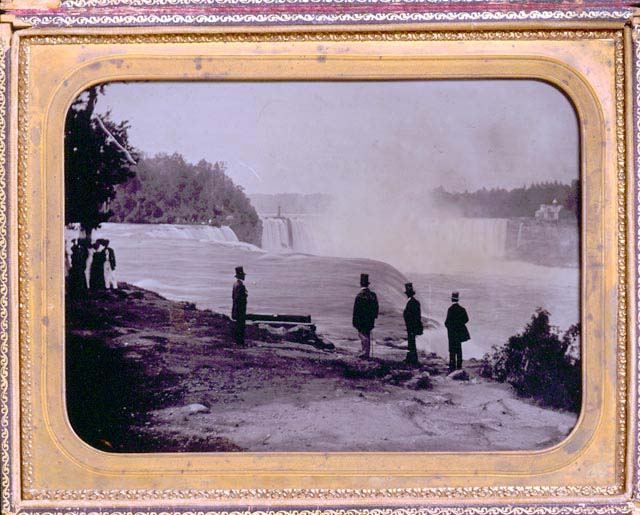 In An Englishwoman in America (1856), Bird finds the view of Niagara Falls marred by picnic detritus. On first impression, Bird was astonished at the falls and the mist’s power and the roar. But a closer look revealed that the falls are “disfigured,” for “Not...
In An Englishwoman in America (1856), Bird finds the view of Niagara Falls marred by picnic detritus. On first impression, Bird was astonished at the falls and the mist’s power and the roar. But a closer look revealed that the falls are “disfigured,” for “Not...
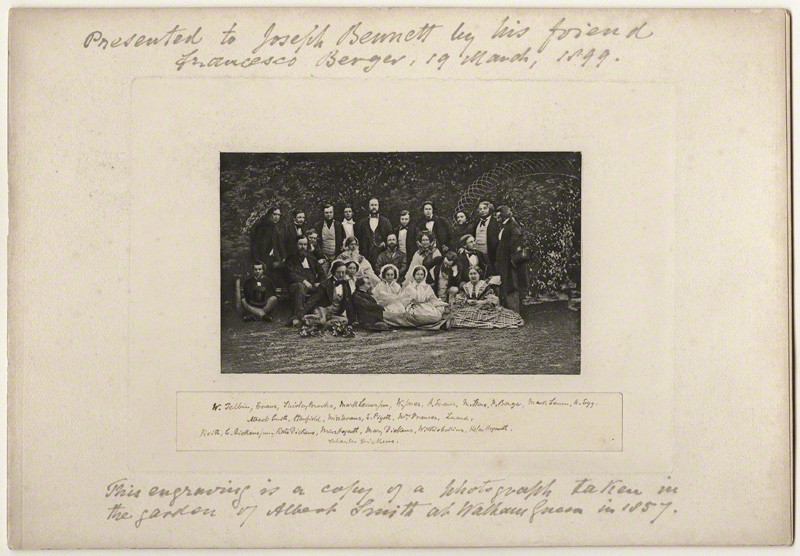 Frederic Ouvry’s invitation to a July garden party at his home in Fulham Green, London, insinuates that guests would gather with two celebrities: Albert Smith, the famous lecturer of “The Glaciers of Mont Blanc,” and Charles Dickens. The latter was...
Frederic Ouvry’s invitation to a July garden party at his home in Fulham Green, London, insinuates that guests would gather with two celebrities: Albert Smith, the famous lecturer of “The Glaciers of Mont Blanc,” and Charles Dickens. The latter was...
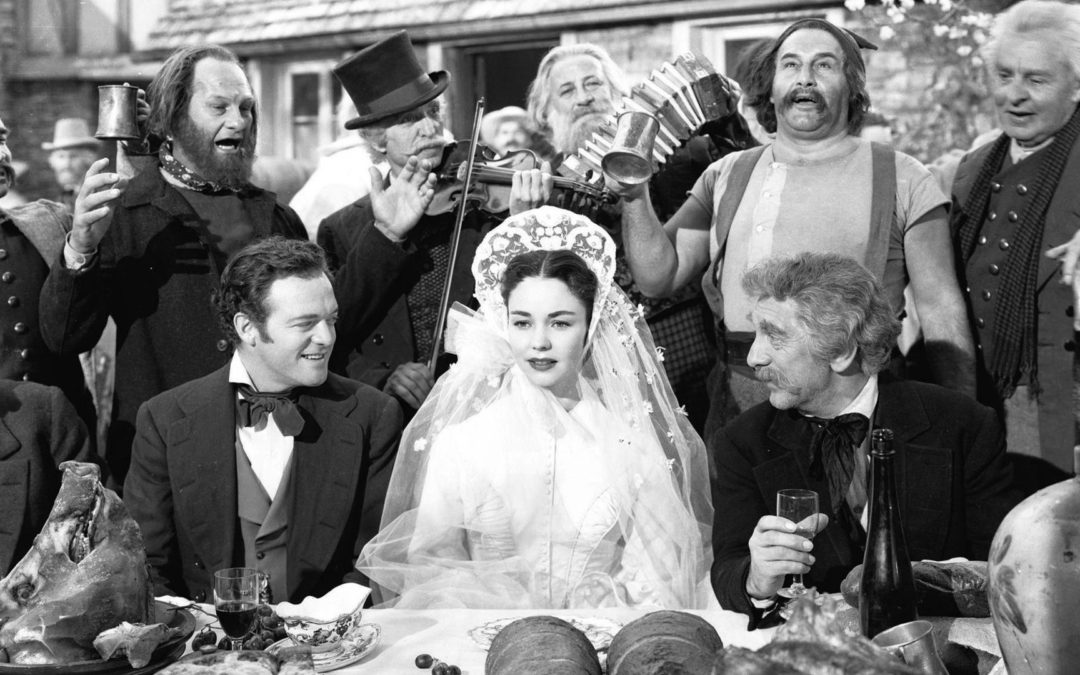 Flaubert’s Madame Bovary is attack on the French bourgeoisie’s crudities and lack of taste. A pivotal moment occurs at Emma Rouault’s wedding party, a vaguely picnicky outdoor event. The party foreshadows Emma’s disastrous relationship with...
Flaubert’s Madame Bovary is attack on the French bourgeoisie’s crudities and lack of taste. A pivotal moment occurs at Emma Rouault’s wedding party, a vaguely picnicky outdoor event. The party foreshadows Emma’s disastrous relationship with...
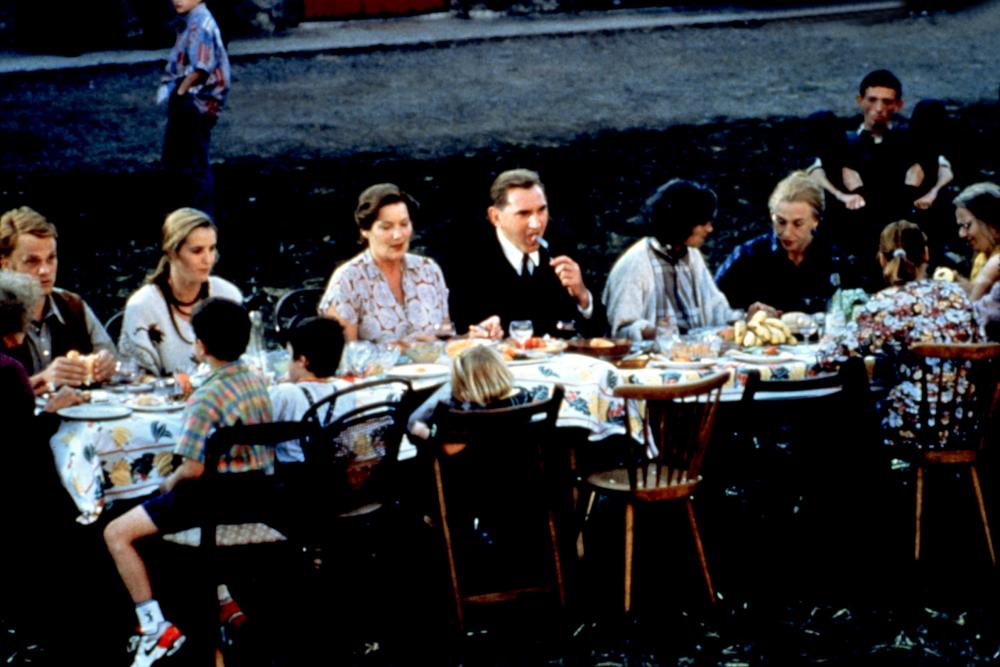 Antonia is the matriarch of an extended family: her daughter, child, and partner, her friends, and castoffs who need a home. Each year, a long table is set in the barnyard for the extended family to picnic. See Marleen Gorris. Antonia’s Line (1995). Screenplay by...
Antonia is the matriarch of an extended family: her daughter, child, and partner, her friends, and castoffs who need a home. Each year, a long table is set in the barnyard for the extended family to picnic. See Marleen Gorris. Antonia’s Line (1995). Screenplay by...
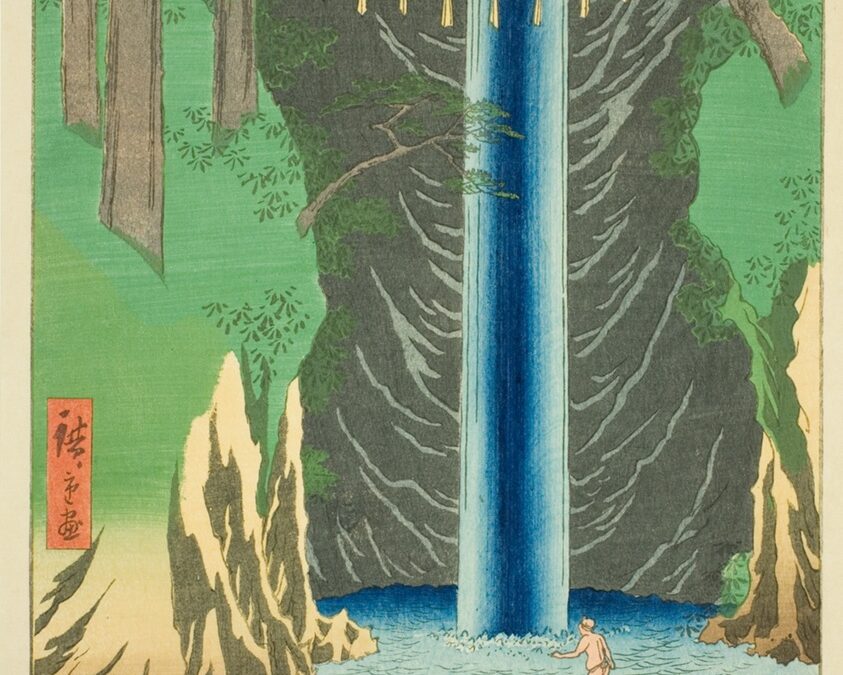 The Fūdo Falls is known for its spiritual and curative powers. A rope with tassels marks a sacred Shinto space. It’s among the most well-known scenic waterfalls in Japan. ButHiroshige’s vision of the falls is his own. Picnickers sit at a table below the falls. In the...
The Fūdo Falls is known for its spiritual and curative powers. A rope with tassels marks a sacred Shinto space. It’s among the most well-known scenic waterfalls in Japan. ButHiroshige’s vision of the falls is his own. Picnickers sit at a table below the falls. In the...
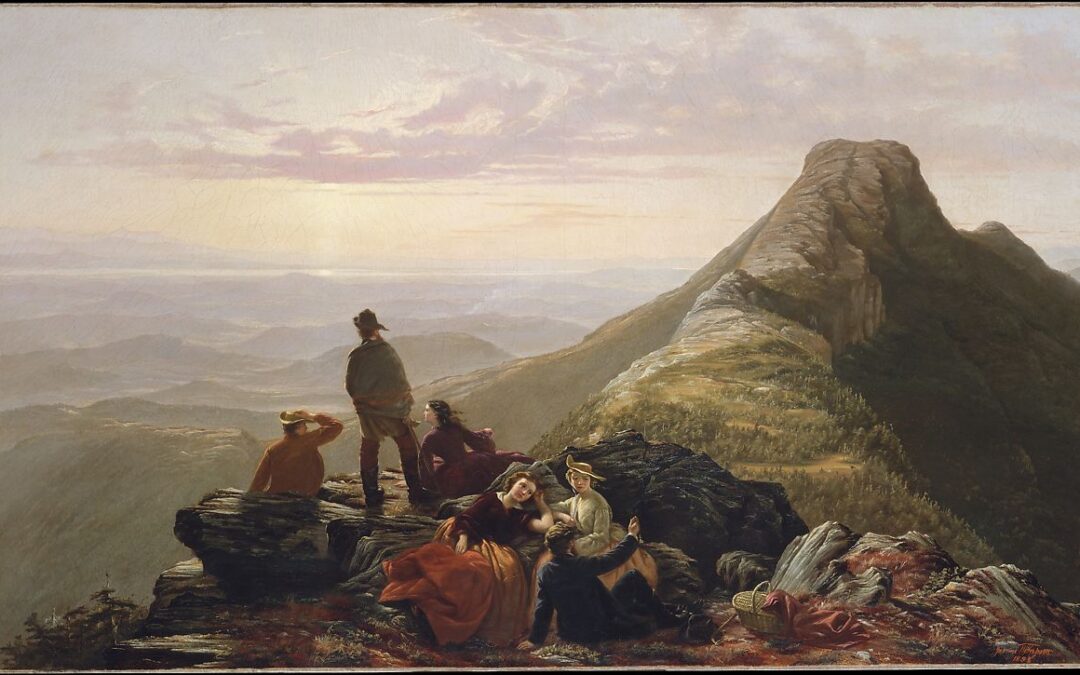 Six hikers have reached a plateau near Mansfield Mountain’s top and are ready to picnic just before sunset. Thompson titled the painting a Belated Party to provide tension, and we wonder if the picnickers will safely walk down the 4400-foot mountain in the...
Six hikers have reached a plateau near Mansfield Mountain’s top and are ready to picnic just before sunset. Thompson titled the painting a Belated Party to provide tension, and we wonder if the picnickers will safely walk down the 4400-foot mountain in the...
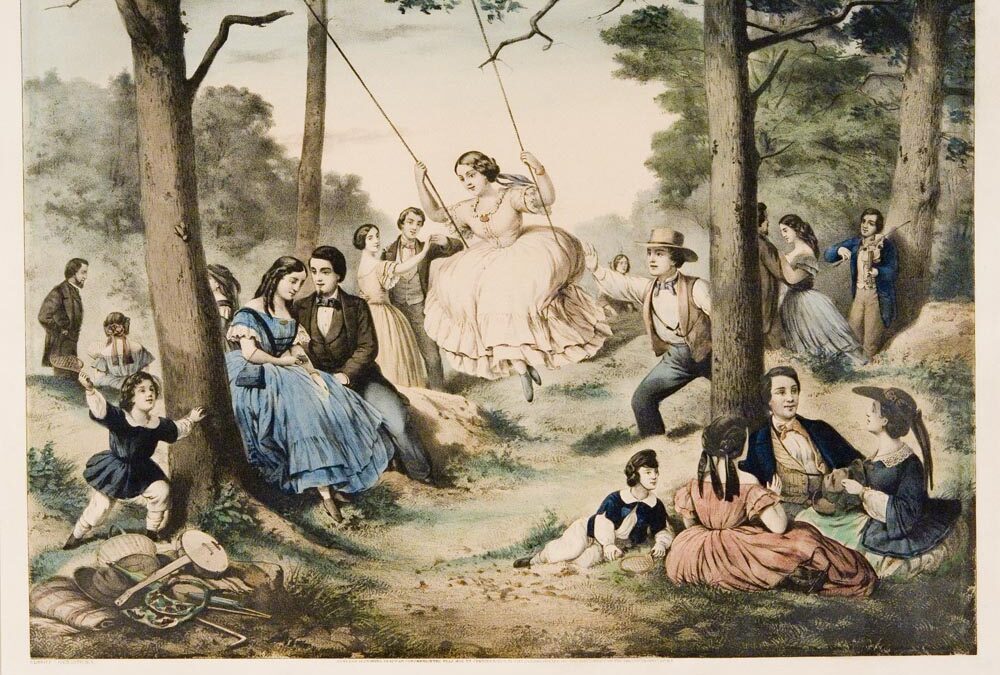 Nathaniel Currier and James Merritt Ives’ lithographs The Pic-Nic Party and The Childrens Pic-Nic are picnics without food or drink. In The Pic-Nic Party, the central figure is a woman on a swing pushed by a young man, probably her beau. Just in front of her is a...
Exalting himself as a star hunter, “un homme libre,” or free man, Courbet painted himself in the center of Le Repas de chasse. Many luncheons, repas de chasse, were already painted by Watteau, Van Loo, De Troyes, and others, but their aristocratic...
Nathaniel Currier and James Merritt Ives’ lithographs The Pic-Nic Party and The Childrens Pic-Nic are picnics without food or drink. In The Pic-Nic Party, the central figure is a woman on a swing pushed by a young man, probably her beau. Just in front of her is a...
Exalting himself as a star hunter, “un homme libre,” or free man, Courbet painted himself in the center of Le Repas de chasse. Many luncheons, repas de chasse, were already painted by Watteau, Van Loo, De Troyes, and others, but their aristocratic...
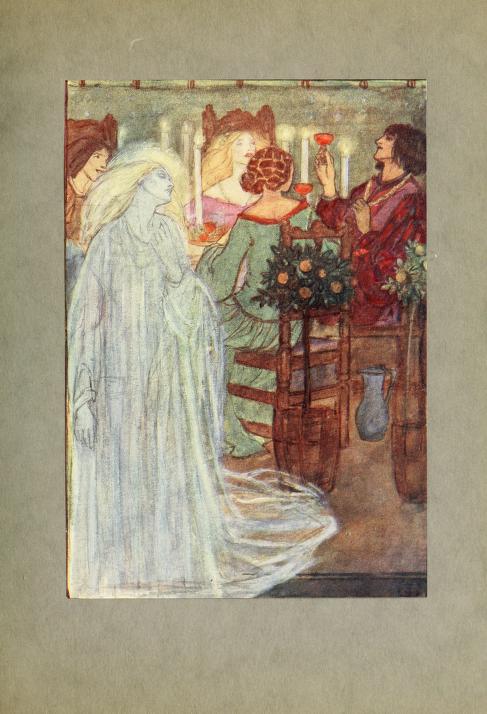 Rossetti’s “At Home” (1858) was initially titled “After the Picnic.” but when her brother Dante declared picnics frivolous and insisted on a change, Ms. Rossetti complied. It’s known Rossetti composed the poem after attending a real...
Picnicking in the Woods. Harper’s Weekly, Vol. II, September 4, 1858. Woodblock
Rossetti’s “At Home” (1858) was initially titled “After the Picnic.” but when her brother Dante declared picnics frivolous and insisted on a change, Ms. Rossetti complied. It’s known Rossetti composed the poem after attending a real...
Picnicking in the Woods. Harper’s Weekly, Vol. II, September 4, 1858. Woodblock
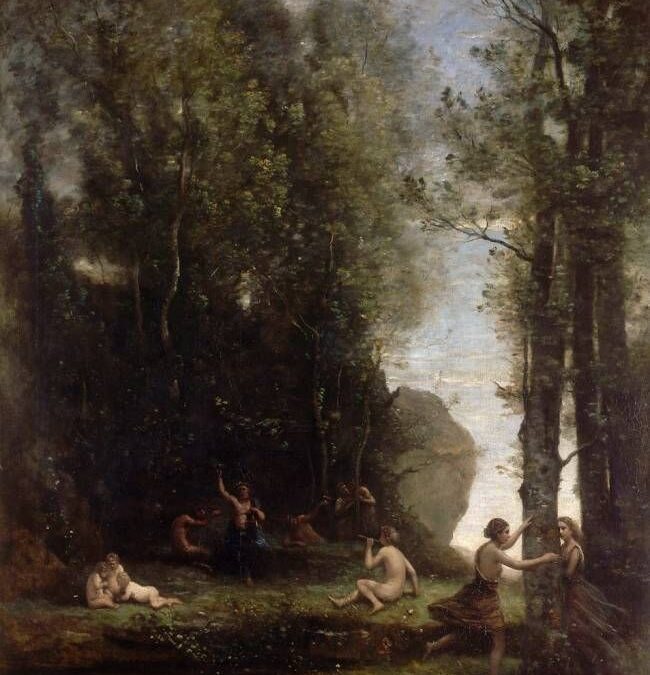 Corot’s Idylle is picnicky. Pan’s presence usually suggests some sort of sexuality or chaotic action, but the scene is a joyful but serene. Featured Image: Musée des Beaux Arts, Lille
Corot’s Idylle is picnicky. Pan’s presence usually suggests some sort of sexuality or chaotic action, but the scene is a joyful but serene. Featured Image: Musée des Beaux Arts, Lille


















